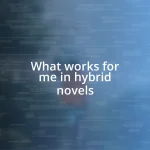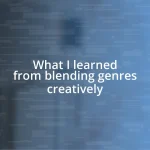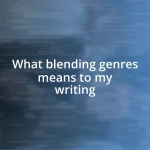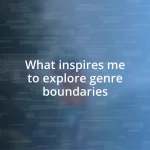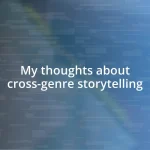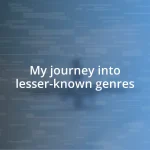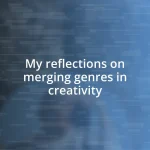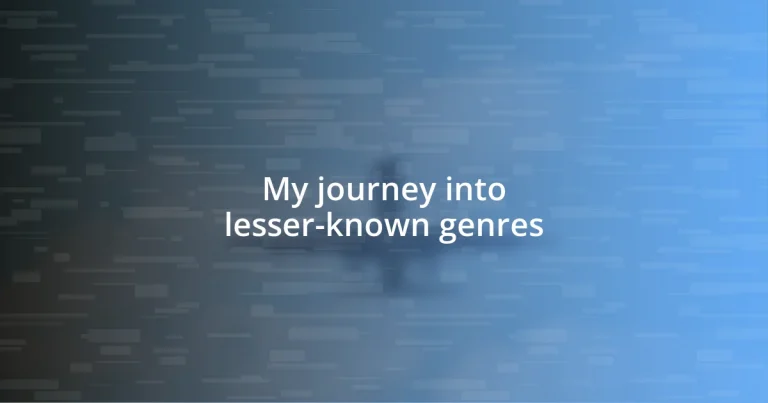Key takeaways:
- Exploring lesser-known genres, such as “grimdark” fantasy or “bizarro fiction,” enhances emotional understanding and challenges perspectives on morality and reality.
- Engaging with niche communities and resources fosters connections and deepens appreciation for unique narratives, allowing for rich discussions and shared experiences.
- Creating genre playlists and sharing insights from reading journeys not only enriches personal engagement with literature but also promotes dialogue and collaboration among enthusiasts.
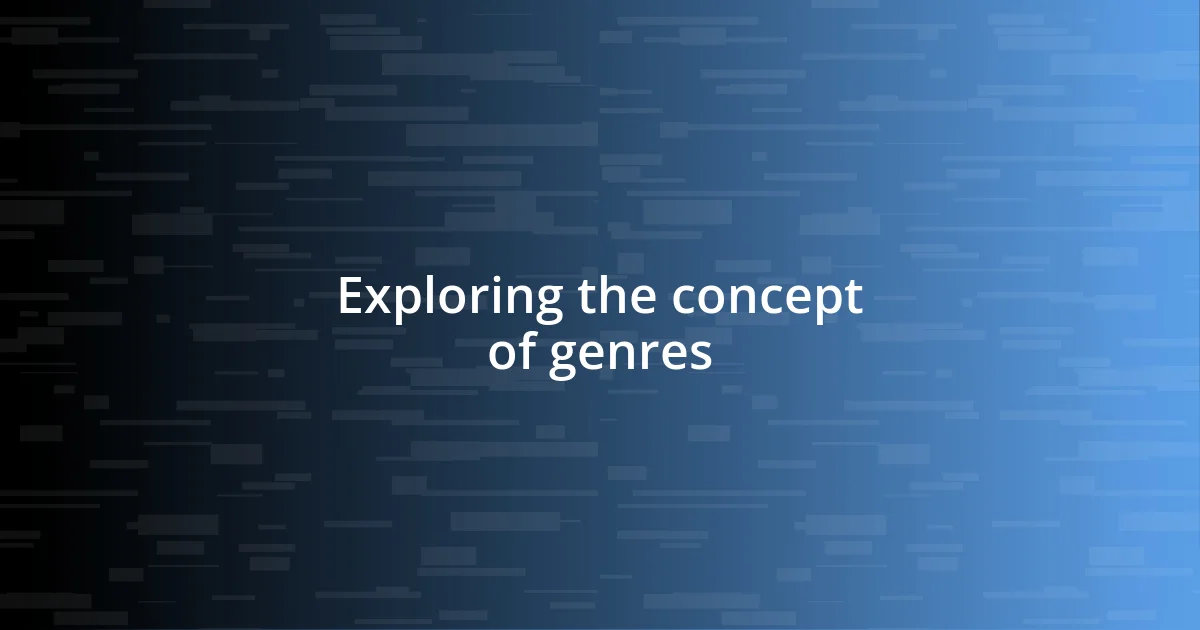
Exploring the concept of genres
Genres are fascinating constructs that help us categorize and understand various forms of creative expression. I remember the first time I stumbled upon a “slipstream” novel; it felt like stepping through a portal into a dimension where the rules of reality were blissfully bent. Isn’t it exhilarating to think that within these genres, there exists a world of limitless possibilities?
As I delved deeper into lesser-known genres, I realized each one reflects a unique culture or subculture, often mirroring the complexities of human experience. For example, discovering “grimdark” fantasy introduced me to stories devoid of traditional heroes, where moral ambiguity reigns. Have you ever found yourself rooting for a character who isn’t a clear hero or villain? This dynamic pulls me in and makes me question my own values and beliefs, expanding my emotional landscape.
Genres also serve as a bridge between creators and their audiences, echoing shared experiences and emotions. I often find myself discussing works with friends that straddle genre lines, like “magical realism,” which reminds me of the complexities of life itself. It’s often in these gray areas where we can explore the depths of our feelings and perceptions, don’t you think? I believe that by engaging with these diverse genres, we not only enrich our understanding of art but also our understanding of ourselves.
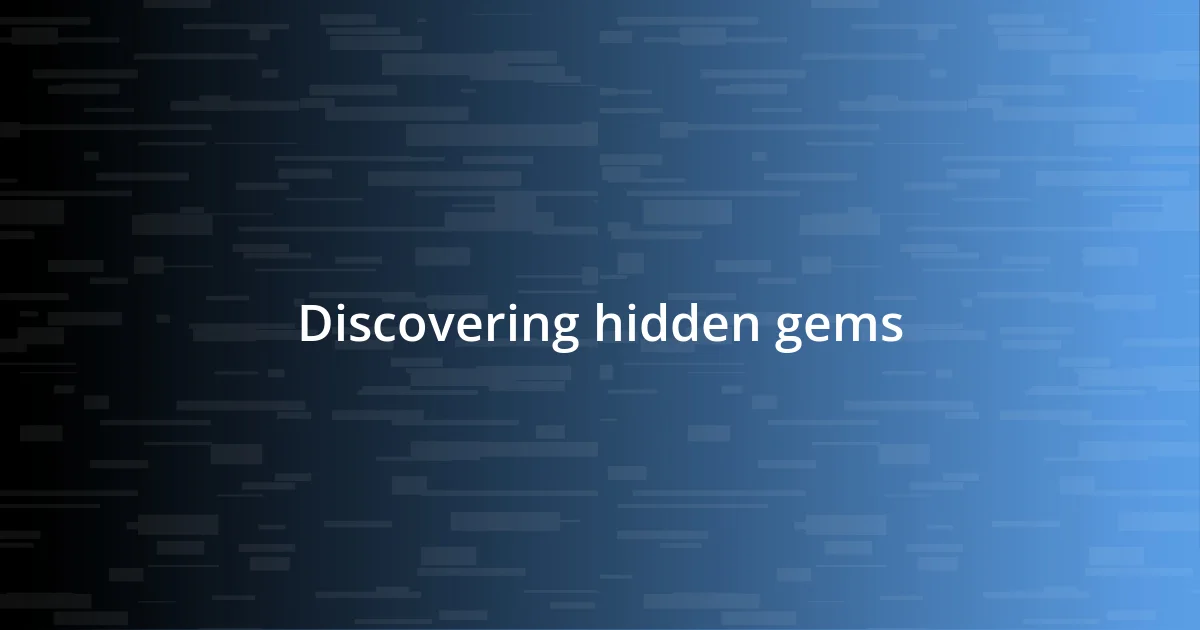
Discovering hidden gems
As I ventured further into hidden genres, I was amazed by how many incredible stories lay just beneath the surface. I vividly recall discovering “bizarro fiction” during a late-night bookshop expedition. The blend of absurdity and creativity was mind-bending, pushing my boundaries of what a narrative could be. Have any of you ever read something so unconventional that it left you questioning reality? That’s exactly what bizarro fiction did for me, and it’s a testament to how varied the literary landscape can be.
Each hidden gem I uncovered not only entertained but also challenged my perspectives. For instance, I once picked up a collection of “cyberpunk” stories, which whisked me away to futures filled with neon lights and technological dystopias. I felt a mix of fascination and dread as authors painted vivid landscapes where humanity intertwines with technology. Encountering these themes allows me to reflect on my own relationship with technology in our rapidly changing world.
The thrill of uncovering these lesser-explored genres is truly unparalleled. Take “Afrofuturism,” for example; I was introduced to it at a small literary festival. The way it intertwines African culture with futuristic imagery sparked a fire in me to explore cultural legacies through a new lens. It’s experiences like these that ignite passion and curiosity, encouraging us to embrace stories that may not be on everyone’s radar.
| Genre | Key Characteristics |
|---|---|
| Bizarro Fiction | Absurd scenarios, unconventional narratives |
| Cyberpunk | High tech, low-life futures, societal critiques |
| Afrofuturism | Blends African culture with sci-fi elements |
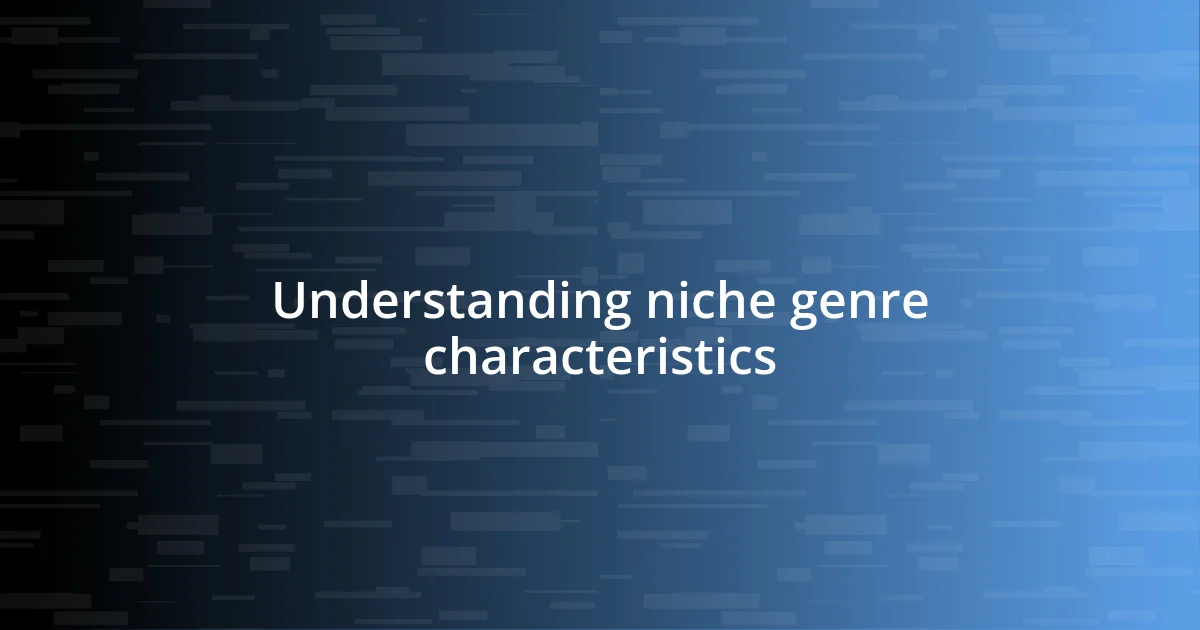
Understanding niche genre characteristics
Understanding niche genres is like peering through a keyhole into vibrant worlds often overlooked by mainstream media. The characteristics of these genres can vary widely, but they generally share a commitment to pushing boundaries and exploring themes that resonate deeply with specific audiences. For instance, I felt a profound connection the moment I encountered “slipstream” fiction; its blend of fantasy and reality invites readers to question the very fabric of their existence and perceive life through a different lens.
- Obsessive Detailing: These genres often have a meticulous attention to detail, immersing the reader in richly crafted worlds.
- Emotional Resonance: They frequently delve into themes that provoke intense emotional responses, making readers feel seen and understood.
- Cultural Reflection: Many niche genres mirror societal issues, allowing for deeper explorations of identity, race, and other pivotal topics.
- Genre Blending: They often mix elements from various genres to create unique narratives that defy conventional categorization.
Consider my encounter with “mystery romance,” a genre I stumbled upon while looking for light reading. It struck me how the emotional stakes of love intertwined seamlessly with the suspense of crime solving. These stories captivated me not just with thrilling plot twists, but with their deep explorations of trust, vulnerability, and the human experience. What I love about niche genres is their ability to reflect our complex realities while offering an escape into beautifully bizarre worlds. It’s as if they’re inviting me to explore the unknown corners of my imagination and to reflect on my own realities.
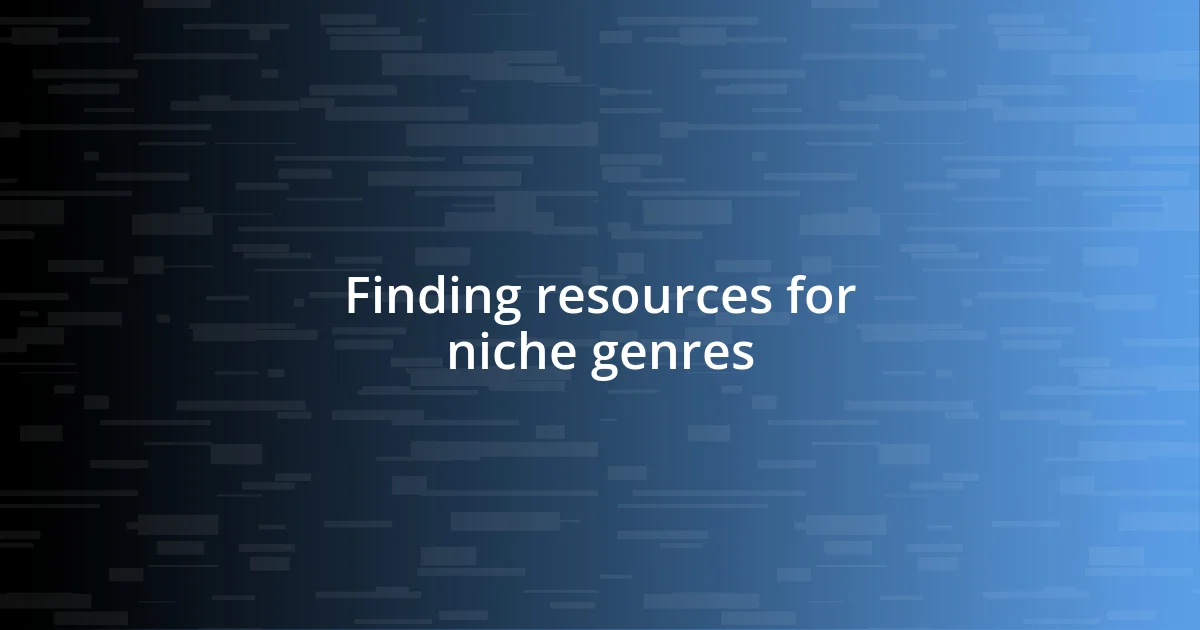
Finding resources for niche genres
Finding resources for niche genres can sometimes feel like a treasure hunt, where the most valuable gems are hidden among the mainstream offerings. I remember one particular afternoon spent scouring online forums dedicated to indie publications. I stumbled upon a vibrant community of readers and writers who shared unfiltered recommendations for everything from magical realism to weird horror. Have you ever found a book recommendation from someone so passionate that it made you curious? That connection made me realize there are entire worlds waiting beyond my typical bookshelf.
Exploring websites like Goodreads or specialty blogs can also lead you to unexpected finds. For instance, I discovered “Sunshine” by Brian D’Amato through a blog that focused solely on literary absurdism. It was a revelation! The raw, experimental narrative resonated with me in ways I hadn’t anticipated. Niche genre resources are often created by enthusiastic fans who authentically share their experiences and insights, making their suggestions all the more appealing. I can’t help but wonder—what hidden stories might be waiting for you in your next casual click?
Don’t underestimate social media either; platforms like Twitter and Instagram are teeming with niche genre advocates sharing their latest reads. I followed a couple of accounts that highlight lesser-known works, and it changed my reading landscape entirely. Imagine stumbling upon an author who writes in a genre you didn’t even know existed, and their story completely alters your perception of narrative possibilities. It’s exhilarating to think that with each resource I uncover, I’m not just finding books; I’m discovering pieces of art that speak to parts of my identity I haven’t yet explored.
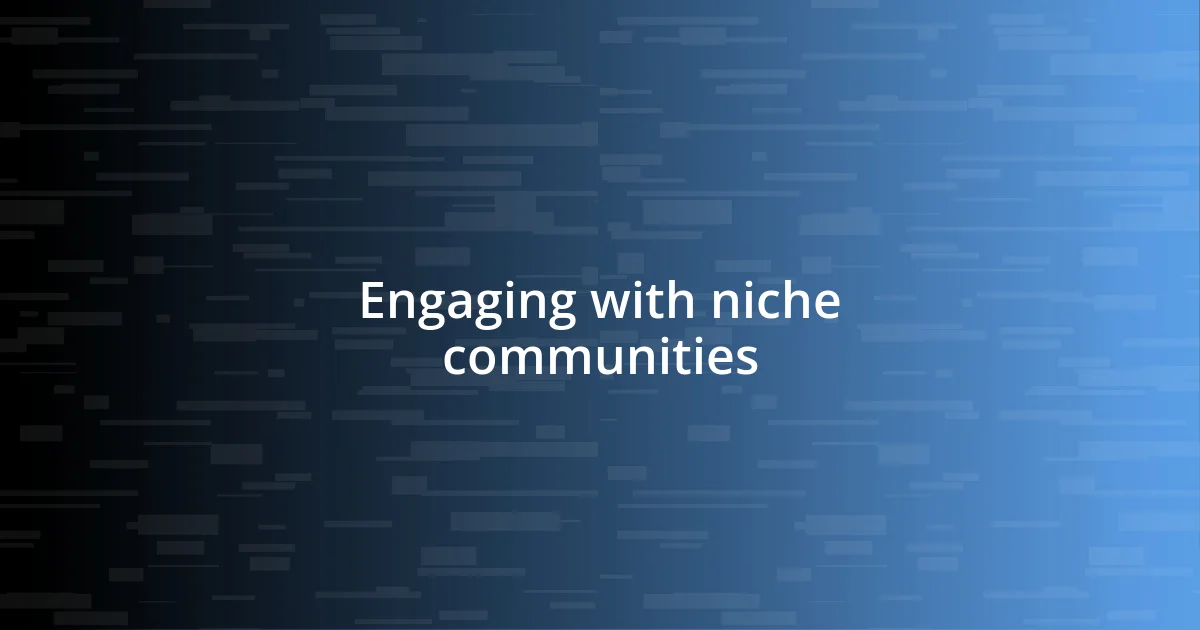
Engaging with niche communities
Engaging with niche communities has been a revelation for me. When I first joined a Slack group dedicated to the subgenre of “cli-fi,” or climate fiction, I felt an overwhelming sense of belonging. Can you imagine discussing the intricacies of a narrative that grapples with real-world issues like climate change and its impact on human life? The camaraderie and shared passion amplified my appreciation for these stories, sparking engaging debates and rich conversations.
I also remember participating in a local book club that focused solely on speculative fiction. Our discussions were vibrant, filled with varying interpretations and insights. It was fascinating how a single story could evoke such differing emotional responses among us. Have you ever felt a book speak differently to various readers? I did, and that experience highlighted the power of niche genres to foster deep connections.
Moreover, attending genre-specific conventions has been a game changer. I recall standing in line to get a book signed by an author whose work had profoundly influenced my perspective. The energy of being surrounded by fellow fans, all celebrating the intricacies of lesser-known genres, filled me with joy. There’s something magical about engaging with people who are just as passionate as you are—it broadens your horizons and deepens your commitment to exploring these captivating worlds.

Creating your own genre playlists
Creating your own genre playlists is a delightful way to dive deeper into the soundscapes of lesser-known genres. I often curate mixes that reflect my mood or the themes I’m exploring in my reading. For example, after finishing a haunting dark fantasy novel, I crafted a playlist filled with atmospheric and ethereal tracks that echoed the story’s tone. It’s amazing how music can amplify our connection to literature, isn’t it?
When I began experimenting with genre playlists, I discovered the joy of blending unconventional tracks. Have you ever thought about pairing an obscure punk band with haunting folk melodies? I find that unexpected combinations not only make the listening experience richer but also lead me to explore new avenues of creativity. It’s like opening a treasure chest, where every track unlocks a new layer of inspiration.
I also recommend keeping a notebook handy to jot down song recommendations from your reading or discussions with friends. One time, someone suggested an artist whose sound perfectly captured the essence of a magical realism book I loved. Not only did the music resonate with the narrative, but it also deepened my understanding of the genre itself. Engaging with playlists in this way can turn your listening experience into a meaningful exploration of the stories that shape us.

Sharing your journey and insights
Sharing my journey into lesser-known genres has been quite an adventure that I relish. I remember when I first decided to blog about my experiences with these niche stories; the act of writing not only solidified my understanding but also opened up a space for dialogue with fellow enthusiasts. Have you ever found joy in sharing your thoughts on a book and watching how others relate to it in unexpected ways? It’s incredible how articulate reflections can spark conversations that deepen appreciation for these unique narratives.
One of my most memorable experiences was when I hosted an online discussion about magical realism with a few friends. The depth of our insights was surprising—each person shared personal interpretations that unfolded layers of meaning I hadn’t considered. I couldn’t help but feel a rush of excitement questioning how these stories meld with our own realities. There’s a certain magic that comes from sharing your point of view and hearing how it resonates with others; it creates a bond and enriches our perspectives.
Additionally, I find that sharing insights on lesser-known genres can shine a light on gems that often go unnoticed. I once recommended an obscure graphic novel to a colleague, and they responded with such enthusiasm that it reignited my love for the genre. It was a wonderful reminder of how our shared journeys can illuminate paths for others. What better way to celebrate these hidden treasures than by exchanging stories and recommendations?
